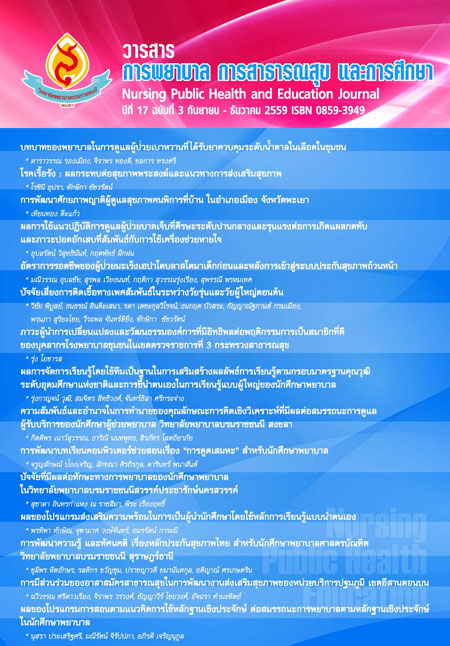บทบาทของพยาบาลในการดูแลผู้ป่วยเบาหวานที่ได้รับยาควบคุมระดับน้ำตาลในเลือดในชุมชน
คำสำคัญ:
บทบาทพยาบาล, เบาหวาน, ยาควบคุมน้ำตาล, ชุมชน, Nursing role, diabetes mellitus, glycemic control medication, communityบทคัดย่อ
โรคเบาหวานเป็นปัญหาสาธารณสุขที่ทวีความรุนแรงขึ้นทั่วโลกรวมทั้งประเทศไทย โรคเบาหวานเป็นโรคไม่ติดต่อเรื้อรัง ที่ส่งผลกระทบต่อภาวะสุขภาพของผู้ป่วย หากไม่สามารถควบคุมระดับน้ำตาลในเลือดให้อยู่ในภาวะปกติได้ จะทำให้ผู้ป่วยเกิดความไม่สุขสบายจากภาวะน้ำตาลในเลือดต่ำหรือสูงกว่าปกติ ทำให้เกิดภาวะแทรกซ้อน และถึงแก่ความตายก่อนเวลาอันควรการปรับพฤติกรรม เช่น การควบคุมอาหาร การออกกำลังกาย ใช้สำหรับควบคุมระดับน้ำตาลในกระแสเลือด ในระยะแรกหากผู้ป่วยไม่สามารถควบคุมระดับน้ำตาลในเลือดให้เป็นปกติได้ก็จำเป็นต้องได้รับการรักษาด้วยยายาที่ใช้รักษาโรคเบาหวาน มี 2 กลุ่มใหญ่ 1) อินซูลินและ 2) ยาเม็ดลดระดับน้ำตาล ซึ่งปัญหาการใช้ยาในผู้ป่วยเบาหวานที่พบบ่อย ได้แก่ การใช้ยาในขนาดที่สูงหรือต่ำกว่าคำสั่งแพทย์การขาดยา การหยุดยาเอง การลืมรับประทานยาและการใช้ยาลดระดับน้ำตาลร่วมกับสมุนไพรปัญหาดังกล่าวส่งผลกระทบต่อการควบคุมระดับน้ำตาลในเลือดทำให้ระดับน้ำตาลในเลือดต่ำหรือสูงกว่าปกติ ซึ่งทำให้เกิดอันตรายได้ ดังนั้นพยาบาลควรมีการประเมินผลการควบคุมระดับน้ำตาลในเลือดของผู้ป่วยว่าเป็นไปตามเป้าหมายของการรักษาที่ตั้งไว้หรือไม่และติดตามพฤติกรรมการใช้ยาที่สำคัญควรมุ่งเน้นให้ผู้ป่วยสามารถดูแลตนเองได้ถูกต้องโดยการให้ความรู้และส่งเสริมให้ผู้ป่วยมีความเข้าใจกับโรคตลอดจนความจำเป็นของการรับประทานยาอย่างเคร่งครัดทั้งนี้เพื่อให้เกิดประสิทธิภาพรักษาสูงสุดลดการเกิดผลข้างเคียงจากการใช้อินซูลินและไม่เกิดภาวะแทรกซ้อนจากการใช้ยาควบคุมระดับน้ำตาลในเลือด
The Nursing’ role in Caring the Person with Diabetes Mellitus Receiving Glycemic Control Medication in Community
Diabetes mellitus is a health problem worldwide and gradually increase year by year, including Thailand. Diabetes is a non-communicable disease that affects the health status of the patients. If the patient cannot control his blood glucose levels within the normal range, the patient will suffer from hyperglycemia or hypoglycemia, increasing the chance of complication and risk of premature death. Behavioral adaptation such as dieting control and regular exercise are usedto control the blood glucose levels in early stage of diabetes mellitus. However, if the blood glucose is still higher than normal, medications will be used to control the blood glucose level. There are 2 types of diabetic medicine: 1) insulin injection and 2) oral glycemic control agents. The common problems in using diabetes medication are as follow: use lower or higher dose of medication than prescription, lack of medicines, stop taking medication, forgot to take the medication, and use glycemic control medication together with herbs. The problems stated above can affect the ability of blood glucose control (lower or higher than normal) that might be dangerous. As a result, nurses should evaluate the blood glucose level of the patient whether they achieve their glycemic goals and medication use behavior monitoring. Importantly, nurses should promote self-care in patients such as providing the knowledge and promoting better understanding of the disease.As well as the importance of taking medication as prescribed in order to get the best results of the treatment, which are to decrease the effects of insulin and minimize the side effects of oral diabetes medications.



